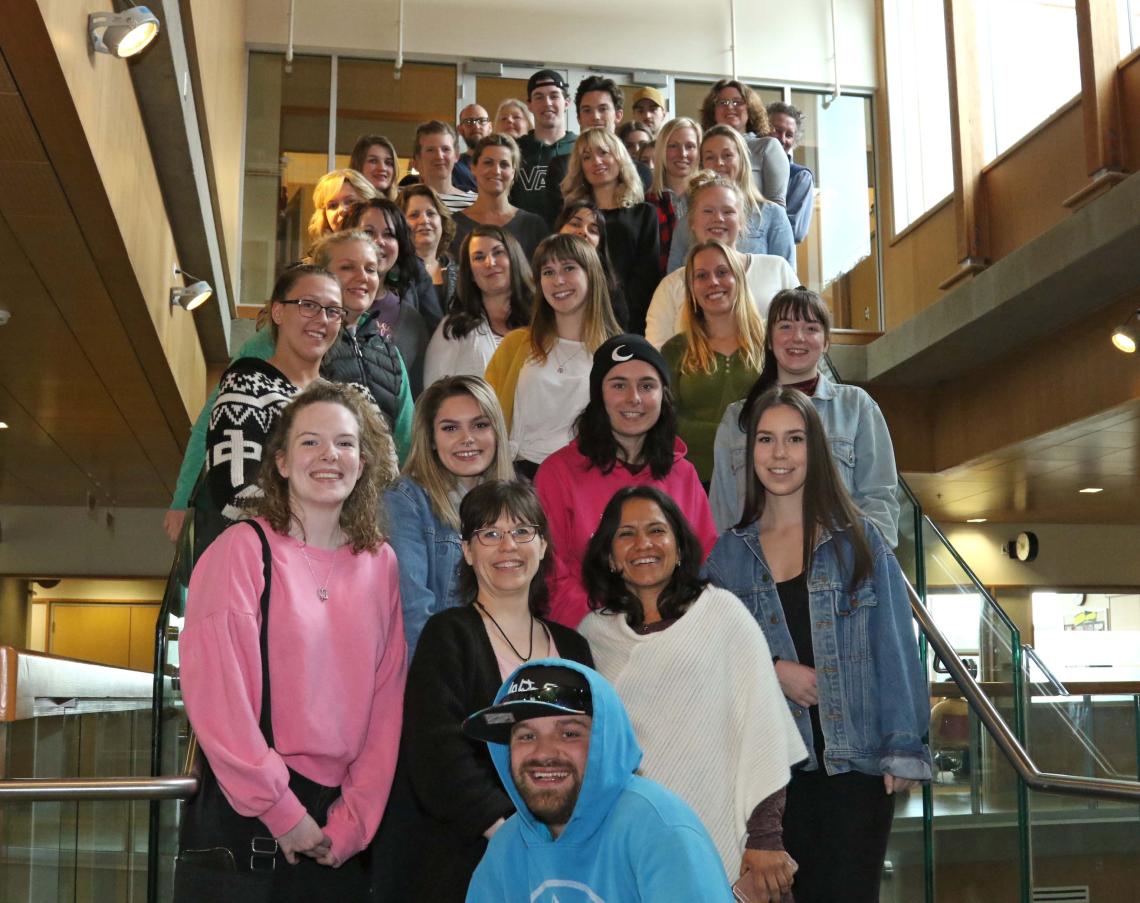
Cody Hill, Pam Dobbs, Rebekah Loranger and Ashley Affleck all jumped at the chance to take the Education Assistant and Community Support Worker program at the Cowichan Campus.
July 9, 2018 - 4:45pm
Campus partners with School District 79 to offer the Education Assistant and Community Support certificate program in Duncan
From classrooms to community settings, there’s a greater need for people trained to work with children, youth and adults with diverse needs.
This need is acutely felt by School District 79 (Cowichan Valley), which continues to recruit qualified and skilled educational assistants to support students with diverse needs in the classroom. Last year, there were positions going unfilled for months, says Larry Mattin, the District’s Principal of Careers and Dual Credit. While some of these positions were specialized in nature, the need for more skilled education assistants in the district is apparent.
“We have a huge need for education assistants because of our increasing student population, which brings an increase in diverse needs,” he says. “We always want to make sure our students have the additional supports they need, and having a strong pool of education assistants who are ready and able to work with our learners will help us provide that support.”
That’s when the district turned to Vancouver Island University’s (VIU’s) Cowichan Campus for help. Mattin knew that VIU’s Nanaimo Campus offered the Education Assistant and Community Support (EACS) certificate program; he worked with Keith Chicquen, VIU Cowichan’s Instructional Director, to bring it to Cowichan. Once word got out, the cohort quickly filled via word-of-mouth, with a long wait list. Students started in January and will finish in August – just in time to start work in September.
“Our role is to serve the needs of the community and so we figured out a way to put the program together after the district came to us,” explains Chicquen.
 The EACS program teaches students how to work with children and adults with mental, physical or emotional conditions. For students like Ashley Affleck, a dual-credit student from Frances Kelsey Secondary School, having the program so close to home and available to high school students through the dual-credit program has made all the difference.
The EACS program teaches students how to work with children and adults with mental, physical or emotional conditions. For students like Ashley Affleck, a dual-credit student from Frances Kelsey Secondary School, having the program so close to home and available to high school students through the dual-credit program has made all the difference.
“I live in Lake Cowichan, so I would have had to move to Nanaimo,” she says. “I want to help children of all abilities access knowledge. I’m sure I’m going to find work here that I love.”
A unique feature of the Cowichan delivery model is that students take all of their classes on Fridays and Saturdays, which allows them to work and manage family obligations better. This option is the only way Pam Dobbs, a mother of two who has worked as a Certified Dental Assistant for almost 25 years, is able to take the program.
“I’m able to work, be a mom and manage school all in the same week,” she says. “I have one child with autism and ADHD and another with anxiety disorder, so I understand the need for these types of positions. For me this could be a stepping stone towards working as an occupational therapist or behaviour interventionist one day.”
Leif Rasmussen, Co-Chair of the EACS Program, says many of his students ladder into other programs at VIU. The program gives students 30 credits of first-year university courses, which are commonly used towards child and youth care, social work, education and disabilities studies programs.
“It’s an in-demand program – people generally walk out of the classroom and directly into jobs,” he says. “There’s no shortage of work in this area.”
The school district holds the entire contract for the Cowichan program, and is able to fund its own students to take the program through dual credit, a program that allows high school students to take university courses and have the credits count towards both high school graduation and university. Adults who want to take the program are charged a fee by the district to recoup costs.
Mattin says there are 12 dual-credit and 24 adults in the program, which started in January. Due to the wait list, the district has opened up another cohort in September, which is already full.
All students will participate in a three-week practicum with the district and those who do well will likely be offered jobs, he says. Those who prefer can choose to work in community instead, where there is also demand for trained community support workers.
“We are helping these students find a career path,” he says. “In the end, this program is going to change lives.”
To learn more about the program, visit EACS.
-30-
MEDIA CONTACT:
Jenn McGarrigle, Communications Officer, Vancouver Island University
P: 250.740.6559 | C: 250.619.6860 | E: Jenn.McGarrigle@viu.ca | T: @VIUNews
Tags: Cowichan Campus | Education Assistant and Community Support Worker | Student Success






